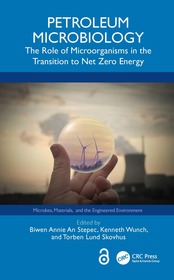
Petroleum Microbiology
The Role of Microorganisms in the Transition to Net Zero Energy
Series: Microbes, Materials, and the Engineered Environment;
- Publisher's listprice GBP 49.99
-
23 882 Ft (22 745 Ft + 5% VAT)
The price is estimated because at the time of ordering we do not know what conversion rates will apply to HUF / product currency when the book arrives. In case HUF is weaker, the price increases slightly, in case HUF is stronger, the price goes lower slightly.
- Discount 10% (cc. 2 388 Ft off)
- Discounted price 21 494 Ft (20 471 Ft + 5% VAT)
Subcribe now and take benefit of a favourable price.
Subscribe
23 882 Ft

Availability
Estimated delivery time: In stock at the publisher, but not at Prospero's office. Delivery time approx. 3-5 weeks.
Not in stock at Prospero.
Why don't you give exact delivery time?
Delivery time is estimated on our previous experiences. We give estimations only, because we order from outside Hungary, and the delivery time mainly depends on how quickly the publisher supplies the book. Faster or slower deliveries both happen, but we do our best to supply as quickly as possible.
Product details:
- Edition number 1
- Publisher CRC Press
- Date of Publication 28 September 2025
- ISBN 9781032269566
- Binding Paperback
- No. of pages256 pages
- Size 234x156 mm
- Weight 470 g
- Language English
- Illustrations 61 Illustrations, black & white; 16 Halftones, black & white; 45 Line drawings, black & white; 28 Tables, black & white 699
Categories
Short description:
The role of the microbiome and its potential impact on future energy systems remains an open question. Petroleum Microbiology: The Role of Microorganisms in the Transition to Net Zero Energy explores technological advances in applied microbiology in the oil and gas sector that can be utilized in its transition to renewable energy systems.
MoreLong description:
In the oil and gas industry, technologies have been developed to address microbial-related issues such as oil field souring, microbiologically influenced corrosion, biofouling, and targeted measures for risk assessment and mitigation. Microorganisms have also benefited the oil sector through microbial-enhanced oil recovery and bioremediation of petroleum-contaminated environments. However, during the current transitional phase in the oil and gas industry, the role of the microbiome within the current infrastructure and its potential impact on future systems remains an open question. Petroleum Microbiology: The Role of Microorganisms in the Transition to Net Zero Energy explores technological advances in applied microbiology in the oil and gas sector that can be utilized in its transition to renewable energy systems.
• Provides insights on the potential of applying microbiological techniques in oil systems to pave the way to achieving net-zero energy.
• Presents the major industrial problems caused by microbes and their beneficial activities from both fundamental and applied perspectives.
• Covers such technologies as next-generation sequencing, sampling, and diagnostics.
• Offers a solid foundation on the importance of microbes to key aspects of the energy industry.
• Seeks to answer the question: what role will microorganisms play in the evolution of energy systems?
Featuring chapters from interdisciplinary experts spanning academia and industry, this is an excellent reference for microbial ecologists, molecular biologists, operators, engineers, chemists, and academics involved in the oil and gas sector, working toward energy transition.
The Open Access version of this book, available at http://www.taylorfrancis.com, has been made available under a Creative Commons [Attribution-Non Commercial-No Derivatives (CC-BY-NC-ND)] 4.0 license.
MoreTable of Contents:
Part 1- Introduction. Chapter 1. Petroleum microbiology’s metamorphosis: expert insights on the energy transition. Part 2- Microbial ecology of energy systems. Chapter 2. Impact of microbial biofilms on subsurface energy systems – from oil and gas to renewable energy. Chapter 3. Microbial Control and Sustainability: Can managing microorganisms improve the environmental footprint of Oil & Gas operations?. Part 3- Microbiologically Influenced Corrosion (MIC) and Souring. Chapter 4. Effects of High Salinity PWRI Practice on Sulfidogenesis and Microbially-Influenced Corrosion. Chapter 5. Metagenomic and Metabolomic Analysis of Microbiologically Influenced Corrosion of Carbon Steel in Produced Water. Part 4 - Subsurface reservoir microbiome & hydrocarbon degradation. Chapter 6. The ecological interactions of microbial co-occurrence in oil degradation: the intra- and interspecies relationships in hydrocarbon metabolism. Part 5 - Microbial based emerging technologies in energy systems. Chapter 7. Improved MIC Management using Multiple Lines of Evidence Drives Movement Towards Sustainability – A Case Study in Heavy Oil Production. Chapter 8. Halophyte-based Biocides for Mitigation of Microbiologically Influenced Corrosion (MIC) in Industrial Water Systems. Chapter 9. Response of a model microbiologically influenced corrosion community to biocide challenge. Part 6 - Future perspectives on microorganisms in the energy transition. Chapter 10. Future Perspectives - where do we go from here?
More





